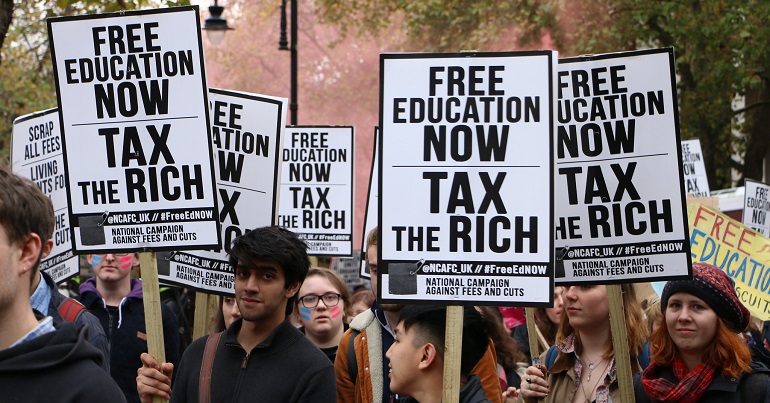Union of Students in Ireland votes to retain free education stance

A special conference of the Union of Students in Ireland (USI), the national union of students in Ireland, has voted to retain the union’s stance that higher education should be 100% funded by the Irish exchequer.
This is despite a campaign by some members of the union’s leadership to push the union towards a ‘graduate tax’ standpoint similar to the one taken by the NUS in the UK.
The special conference itself, in Dublin last week (May 24th), was a culmination of a long, torturous campaign by leadership figures to attempt to change the higher education funding policy of the organisation. The spin is now that it was a glorious exercise demonstrating USI’s credentials as a democratic organisation, rather than a failure for those who wanted to shift the union away from a free education standpoint.
Despite all indications and expectations (including my own) being that delegates would back a graduate tax, only nine delegates voted for a graduate tax while ninety backed free education on the first count. Bizarrely, the status quo (the much-maligned and increasingly unaffordable ‘student contribution charge’) received eighty votes.
While I have time for some members of the USI executive professionally, and get on with almost all of them personally, the direction of USI as a whole is incredibly depressing. The apolitical turn of students (and most of their representatives) in the last decade and before is reflected in its workings. Its leadership often belong to one of the two large right-wing parties that dominate Irish politics, Fianna Fail and Fine Gael. Like those parties, they espouse no principles, only endless pragmatism. It has long forsaken ties with its most obvious allies – the trade union movement. I’m not exactly the most radical leftist in the world, but a whole catalogue of shameful incidents roll back over the time of my involvement in student politics.
I’m thinking particularly of the President of University College Dublin Students’ Union making the head-bashingly brainless remark at USI’s 2012 conference that the Irish government ‘is in thrall to the trade unions’ (???? – The only organisations it’s truly in thrall to is the IMF and the ECB) and so an agreement between the government and trade unions on public sector pay should be renegotiated. I’m thinking about the rabid, wilful desire by members of the executive at Trinity College Dublin Students’ Union to see a system of student loans, similar to that of the UK, put in place. And it doesn’t take a genius to see that the HE funding system we have in the UK isn’t what an SU should be aspiring towards. Forgetting the student movement in Ireland’s proud history of internationalism (particularly the campaigns against apartheid), a motion on Palestine was voted down as ‘not relevant to students.’ As was a motion to campaign for the non-payment of Anglo Irish Bank’s unsecured bondholders.
(How could this not be relevant??)
A vicious sectional split has developed between USI’s leadership and the broad student left. Left-of-centre activists either have become so frustrated that any debate becomes too vicious to be productive, or they flat refuse to become involved in USI. North and south, if you espouse any kind of real left-of-centre politics, you are in danger of becoming labelled a ‘trot’ or ‘one of those people’ regardless of your politics. The apolitical bent is maddening. Not that the blame’s all on one side, mind – we all have to get better at communicating with one another.
In this year of student anniversaries, many of the leadership figures in USI and NUS-USI (Northern Ireland’s national students’ union) will be looking to the past of their student organisations with pride. But we’ve come a long way from the days when USI President Maxine Brady announced she was prepared to go to jail to defend the right of women to access information on abortion. Or the generation of activists that successfully won free education in Ireland in the nineties. I often wonder how many former officers are privately disappointed by the right-wing / apolitical turn that their alma mater has taken. As someone bridging that gap between left-winger and part of the ‘official’ student movement, I certainly occasionally feel embarrassed explaining what’s going on to old student hacks.
While the retention of the free education policy is but a tiny bright spot, it does point to the fact that USI could once more be a progressive force. It can live up to its radical past, in these days where we need radicals more than ever. Any democratic institution, if used in the right way and by the right minds, can be turned into a lever for positive political change. Compared to the monolithic structures and bureaucracies of the trade unions, the effort and pressure that needs to be brought to bear for the broad left to effectively use a students’ union for good, political ends is small by comparison.
I was heartened to find out recently that some of my views are shared by ex-USI President, Peter Mannion .
I will be writing in the near future about the need for the Irish student left to reclaim its leading role at the front of student politics north and south, and some ideas for how this can be achieved.




Say yes to this remark and we will heal a fictional animal!